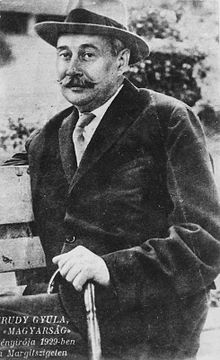Gyula Krúdy
Gyula Krúdy (born October 21, 1878 in Nyíregyháza , † May 12, 1933 in Budapest ) was a Hungarian writer . He was an important prose writer in modern Hungarian literature at the time of the fin de siècle . One essence of his literary style is the delicate play with the means of expression of irony and melancholy , nostalgia and realism .
Life
Gyula Krúdy was born in Nyíregyháza in 1878 as the son of a petty aristocratic lawyer. His mother was an unskilled worker whom the father only married after the birth of the eighth child. Krúdy became a writer against his father's wishes. Success came quickly, but at the end of his life interest in his literary works waned. It was not until the 1950s that his work was rediscovered and appreciated by Hungarian literary scholars.
At the age of fourteen, Krúdy published his first short story. In 1896 he went to Budapest as a journalist and in 1914 became a member of the Petőfi Society. In 1930 Gyula Krúdy received the Baumgarten Prize. His extensive literary work includes 87 novels and around 2,400 stories. He also wrote around 2000 newspaper articles. Krúdy died impoverished in Budapest in 1933.
Selected Works
- Őszi versenyek
- Üres a fészek (1897), first stories
- Az aranybánya (1900), novel
- A podolini kísértet (1906), novel
- Szindbád ifjúsága és utazásai (1911), short stories
- Francia Kastély (1912), novel
- A vörös postakocsi (1913), novel
- Palotai álmok (1914), novel
- Szindbád: A feltámadás (1915), short stories
- Aranykéz utcai szép napok (1916), short stories
- Őszi utazások a vörös postakocsin (1917), novel
- Napraforgó (1918), novel
- Asszonyságok díja (1919), novel
- NN (1920), novel
- With látott Vak Béla szerelemben és bánatban (1921), novel
- Nagy kópé (1921), novel
- Hét bagoly (1922), novel
- Az utitárs (1922), novel
- Valakit elvisz az ördög (1928), novel
- Boldogult úrfikoromban (1930), novel
- Az élet álom (1931), short stories
- A kékszalag hőse (1931), novel
- Purgatórium (1933), novel
- Rezeda Kázmér szép élete (1933), novel
Current German translations
- Serenade from the pierced heart. Sindbad novellas. Bund-Verlag, Frankfurt am Main 1991, ISBN 978-3-766307965 .
- In my time. Roman, Dtv, Munich 1999, ISBN 978-3-423241724 .
- The red stagecoach. Roman, Suhrkamp Verlag, Frankfurt am Main 1999, ISBN 978-3-518395561 .
- The ghost of Podolin. Roman, Kortina Verlag, Vienna 2008, ISBN 978-3-9502315-6-4 .
literature
- Klaus Bonn: About sour lungs with fried eggs - On Gyula Krúdy's novel "Meinerzeit". Twelve course menu. Sulzbach 2003, ISBN 3-929844-15-X
- Gabriella Hima: Self- and external images in Hungarian literature based on selected texts by Dezső Kosztolányi and Gyula Krúdy. In: Wolfgang Müller-Funk (ed.): Kakanien revisited: the own and the foreign (in) the Austro-Hungarian monarchy. Francke, Tübingen and Basel 2002, ISBN 3-7720-3210-9
- John Lukacs : Introduction: Sunflower by Gyula Krúdy. New York Review of Books, New York 2007, ISBN 9781590171868 .
Web links
- Literature by and about Gyula Krúdy in the catalog of the German National Library
- Tabular curriculum vitae and some contents at Hunlit
- Tilman Spreckelsen: The best stew in the world. Article, July 30, 2009, Frankfurter Allgemeine Zeitung
Individual evidence
- ^ Hans Skirecki: Post Comment. In: Gyula Krúdy: Serenade from the pierced heart. Sindbad novellas. Eulenspiegel Verlag, Berlin 1984, p. 200.
- ↑ a b Hans Skirecki: Post Comment. In: Gyula Krúdy: Serenade from the pierced heart. Sindbad novellas. Eulenspiegel Verlag, Berlin 1984, pp. 201-203.
- ↑ Christina Viragh: Afterword. In: Gyula Krúdy: My time. Deutscher Taschenbuch Verlag, Munich 1999, pp. 219–233.
| personal data | |
|---|---|
| SURNAME | Krúdy, Gyula |
| BRIEF DESCRIPTION | Hungarian writer and prose writer |
| DATE OF BIRTH | October 21, 1878 |
| PLACE OF BIRTH | Nyíregyháza |
| DATE OF DEATH | May 12, 1933 |
| Place of death | Budapest |
